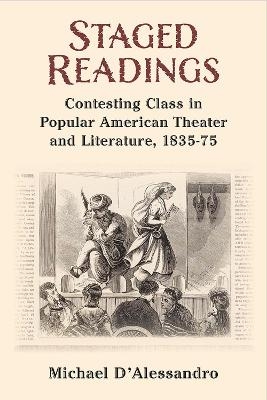
Staged Readings
Contesting Class in Popular American Theater and Literature, 1835-75
Seiten
2022
The University of Michigan Press (Verlag)
978-0-472-13317-8 (ISBN)
The University of Michigan Press (Verlag)
978-0-472-13317-8 (ISBN)
- Lieferbar (Termin unbekannt)
- Versandkostenfrei innerhalb Deutschlands
- Auch auf Rechnung
- Verfügbarkeit in der Filiale vor Ort prüfen
- Artikel merken
How popular culture helped to create class in nineteenth-century America
Staged Readings studies the social consequences of 19th-century America’s two most prevalent leisure forms: theater and popular literature. In the midst of watershed historical developments—including numerous waves of immigration, two financial Panics, increasing wealth disparities, and the Civil War—American theater and literature were developing at unprecedented rates. Playhouses became crowded with new spectators, best-selling novels flew off the shelves, and, all the while, distinct social classes began to emerge. While the middle and upper classes were espousing conservative literary tastes and attending family matinees and operas, laborers were reading dime novels and watching downtown spectacle melodramas like Nymphs of the Red Sea and The Pirate’s Signal or, The Bridge of Death!!! As audiences traveled from the reading parlor to the playhouse (and back again), they accumulated a vital sense of social place in the new nation. In other words, culture made class in 19th-century America.
Based in the historical archive, Staged Readings presents a panoramic display of mid-century leisure and entertainment. It examines best-selling novels, such as Harriet Beecher Stowe’s Uncle Tom’s Cabin and George Lippard’s The Quaker City. But it also analyzes a series of sensational melodramas, parlor theatricals, doomsday speeches, tableaux vivant displays, curiosity museum exhibits, and fake volcano explosions. These oft-overlooked spectacles capitalized on consumers’ previous cultural encounters and directed their social identifications. The book will be particularly appealing to those interested in histories of popular theater, literature and reading, social class, and mass culture.
Staged Readings studies the social consequences of 19th-century America’s two most prevalent leisure forms: theater and popular literature. In the midst of watershed historical developments—including numerous waves of immigration, two financial Panics, increasing wealth disparities, and the Civil War—American theater and literature were developing at unprecedented rates. Playhouses became crowded with new spectators, best-selling novels flew off the shelves, and, all the while, distinct social classes began to emerge. While the middle and upper classes were espousing conservative literary tastes and attending family matinees and operas, laborers were reading dime novels and watching downtown spectacle melodramas like Nymphs of the Red Sea and The Pirate’s Signal or, The Bridge of Death!!! As audiences traveled from the reading parlor to the playhouse (and back again), they accumulated a vital sense of social place in the new nation. In other words, culture made class in 19th-century America.
Based in the historical archive, Staged Readings presents a panoramic display of mid-century leisure and entertainment. It examines best-selling novels, such as Harriet Beecher Stowe’s Uncle Tom’s Cabin and George Lippard’s The Quaker City. But it also analyzes a series of sensational melodramas, parlor theatricals, doomsday speeches, tableaux vivant displays, curiosity museum exhibits, and fake volcano explosions. These oft-overlooked spectacles capitalized on consumers’ previous cultural encounters and directed their social identifications. The book will be particularly appealing to those interested in histories of popular theater, literature and reading, social class, and mass culture.
Michael D’Alessandro isAssistant Professor of English and Theater Studies at Duke University.
Contents
Introduction: The Page, the Stage, and Social Distancing in Nineteenth-Century America
1 George Lippard’s “Theatre of Hell”: Apocalyptic Melodrama and Working-Class Spectatorship in the Quaker City
2 A “Blue-Bottle, Fiery-Eyed Devil”: Washingtonian-Era Temperance Drama and the Making of Middle-Class Culture
3 A Novel National Drama: Restaging the South, Reviving the “Tragic Mulatta” in Boucicault’s The Octoroon
4 Social Stages: Performing Literature and Claiming Culture in Victorian America
Epilogue: “Little” Louisa
Notes
Index
| Erscheinungsdatum | 29.09.2022 |
|---|---|
| Zusatzinfo | 32 illustrations |
| Verlagsort | Ann Arbor |
| Sprache | englisch |
| Maße | 152 x 229 mm |
| Themenwelt | Kunst / Musik / Theater ► Theater / Ballett |
| Geisteswissenschaften ► Sprach- / Literaturwissenschaft ► Anglistik / Amerikanistik | |
| Geisteswissenschaften ► Sprach- / Literaturwissenschaft ► Literaturgeschichte | |
| Geisteswissenschaften ► Sprach- / Literaturwissenschaft ► Literaturwissenschaft | |
| ISBN-10 | 0-472-13317-9 / 0472133179 |
| ISBN-13 | 978-0-472-13317-8 / 9780472133178 |
| Zustand | Neuware |
| Haben Sie eine Frage zum Produkt? |
Mehr entdecken
aus dem Bereich
aus dem Bereich
Poetik eines sozialen Urteils
Buch | Hardcover (2023)
De Gruyter (Verlag)
59,95 €
Buch | Softcover (2024)
belleville (Verlag)
20,00 €


